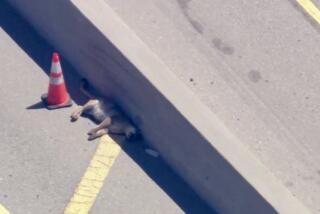Low-Salt Highway Diet
The California Department of Transportation has concluded a study into reports that salting of mountain highways last winter killed trees along the roadside, particularly in the Lake Tahoe area. As a result, Caltrans has sensibly relaxed the policy of attempting to keep highways snow-free through repeated applications of salt, which then gets thrown into the trees by subsequent plowing.
The Legislature had asked the department to switch to more benign chemicals. The substances will be tested further, but are prohibitively costly. The flexible new Caltrans policy should protect vegetation without requiring unreasonable traffic delays during storms. Motorists going into the mountains should note that chains may be required more often than in the past. That would be true in any event if this is a heavy snow season.
The chances of damage may be less in the future anyway. Many trees that died had been weakened by drought and disease before they were hit with the salt. And the pattern of light storms last year resulted in an unusual number of salt applications without as much melting snow to disperse and dilute the chemicals.
The new guideline, developed by a task force under A.J. Phillips of Redding, is a model for any bureaucracy to follow. It is succinct and in easily understood English. For example: “Salt should be applied to prevent the formation of snow pack with applications made as lightly and infrequently as possible.”
Phillips and his colleagues have demonstrated that bureaucracies do not have to be arbitrary, insensitive and impossible to understand. Good study. Sound policy. Nice work.
More to Read
Sign up for Essential California
The most important California stories and recommendations in your inbox every morning.
You may occasionally receive promotional content from the Los Angeles Times.









